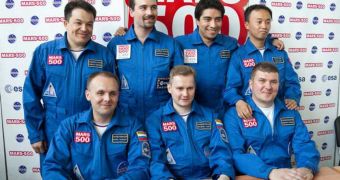Yesterday, the Russian Federal Space Agency (RosCosmos) announced that the full, six-astronaut crew for the Mars 500 experiment had been selected. The mock space crew will shortly enter a complex of capsules meant to simulate the confines of a spacecraft that could one day deliver actual astronauts to the Red Planet. Scientists are trying to determine the effects that long-duration seclusion has on the human mind, and also to learn what the human risk factors for a mission of this scale are. The human guinea pigs will be locked inside the test rooms for a total of 520 days, Space reports.
The Russian officials also said that all six members of the crew were now ready for their endurance trials. There were numerous conditions that people seeking to enter the experiment needed to fulfill, including being specialized in various domains, and speaking fluent Russian and English. The final selection includes three Russians, two Europeans and a Chinese. Together, they will occupy the 18,800 square-foot (1,750 square-meter) complex that makes up the mock, Mars-bound spacecraft. There are five segments to the facility, one of which mimics the harsh conditions on the Martian surface.
The experiment has now been set to begin on June 3. The $15 million trials were appealing to more than 6,000 applicants in 40 countries, who wanted to join in on the action. The Deputy Head of the Mars500 project, Mark Belakovsky, told Russian journalists that all of those who applied were perfectly aware that scientists would have studied their every move, and analyzed the psychological and physiological effects that being secluded from those dear to them triggered on them. The six “astronauts” that made it into the final cut, plus one replacement crew member, will receive about $99,000 each at the end of the study.
The spacecraft that will contain the six is located in a hall of the Institute of Biomedical Problems, in Moscow. The activities that will take place in the modules will be accurately monitored by scientists from both RosCosmos and the European Space Agency (ESA). The “journey” will be divided into three stage – the trip to the Red Planet (250 days), the exploration and colonization phase (30 days), and the return trip to Earth (240 days). When this stage of the Mars 500 experiment concludes, researchers hope to have sufficient data to allow them to make informed recommendations to space agencies. As a side note, none of the people who participated in the first two stages of the project – which lasted for 7, and 105 days, respectively – applied for the 520-days experiment.

 14 DAY TRIAL //
14 DAY TRIAL //